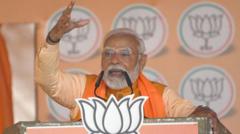With over 60% voter turnout, the BJP's win in Delhi signals a resurgence in Modi's popularity and raises questions about the future of the Aam Aadmi Party (AAP), which has struggled under corruption allegations and leadership challenges.**
BJP Secures Landmark Victory in Delhi Election, Ending AAP's 27-Year Reign**

BJP Secures Landmark Victory in Delhi Election, Ending AAP's 27-Year Reign**
The Bharatiya Janata Party (BJP) triumphs in the Delhi elections, marking a significant shift in power dynamics within the Indian capital.**
The Bharatiya Janata Party (BJP) has claimed victory in the recent Delhi elections, reestablishing its presence in the nation's capital for the first time in 27 years. As counting results indicated that the BJP secured or was leading in 47 out of 70 seats in the legislative assembly, they surpassed the crucial halfway mark of 35 seats needed to form the government. Meanwhile, the incumbent Aam Aadmi Party (AAP) managed to secure leads in 23 seats, presenting a stark contrast to the earlier dominance they enjoyed since 2013.
Prime Minister Narendra Modi heralded the result with optimism on X, stating that "development wins, good governance triumphs," and reaffirmed his commitment to enhancing Delhi's infrastructure. The BJP's decisive win is seen not just as an electoral achievement but as a strategic foothold in the capital that it had been absent from since 1998.
The outcome of this election carries symbolic weight given Delhi's stature as the capital of India. The AAP, which became popular for its focus on welfarism and good governance, faced substantial hurdles as allegations of corruption plagued its leaders. This defeat is particularly damaging as leaders like Arvind Kejriwal, once celebrated for their anti-corruption efforts, lost their seats in key constituencies.
Compounding AAP's challenges, the BJP actively campaigned in the capital, with significant participation from high-profile leaders such as Prime Minister Modi and Home Minister Amit Shah. The campaign was robust, aligning itself with the BJP's broader recent victories in other states including Maharashtra and Chhattisgarh, demonstrating their effective political machine.
The Congress party, once the main opposition force, found itself sidelined in this election, with analysts predicting that it may not secure any seats. This trajectory follows a loss of influence after governing Delhi from 1998 to 2013, marked by its own corruption scandals.
Political analysts suggest that the BJP's decisive victory may bolster Modi's popularity, especially after facing a setback in the previous general elections where the party lost its outright majority. For AAP, this defeat raises pressing questions regarding its future; the party has widely been perceived as losing touch with its primary voter base, particularly the middle class.
Amid the political tumult, key figures within AAP have acknowledged their defeat. Kejriwal expressed acceptance of the electoral outcome while conveying hopes that the BJP will meet the expectations of its voters. Despite a focus on welfare-oriented campaigns by both parties, issues such as Delhi's chronic air pollution remained notably absent from significant discussions during the campaign.
As the BJP celebrates this historic win, analysts predict a shifting landscape for future elections, with the fragmented opposition facing increasing challenges. For the BJP, this electoral success not only symbolizes a return to power in Delhi but also sets the stage for further political maneuvers on a national level.
Prime Minister Narendra Modi heralded the result with optimism on X, stating that "development wins, good governance triumphs," and reaffirmed his commitment to enhancing Delhi's infrastructure. The BJP's decisive win is seen not just as an electoral achievement but as a strategic foothold in the capital that it had been absent from since 1998.
The outcome of this election carries symbolic weight given Delhi's stature as the capital of India. The AAP, which became popular for its focus on welfarism and good governance, faced substantial hurdles as allegations of corruption plagued its leaders. This defeat is particularly damaging as leaders like Arvind Kejriwal, once celebrated for their anti-corruption efforts, lost their seats in key constituencies.
Compounding AAP's challenges, the BJP actively campaigned in the capital, with significant participation from high-profile leaders such as Prime Minister Modi and Home Minister Amit Shah. The campaign was robust, aligning itself with the BJP's broader recent victories in other states including Maharashtra and Chhattisgarh, demonstrating their effective political machine.
The Congress party, once the main opposition force, found itself sidelined in this election, with analysts predicting that it may not secure any seats. This trajectory follows a loss of influence after governing Delhi from 1998 to 2013, marked by its own corruption scandals.
Political analysts suggest that the BJP's decisive victory may bolster Modi's popularity, especially after facing a setback in the previous general elections where the party lost its outright majority. For AAP, this defeat raises pressing questions regarding its future; the party has widely been perceived as losing touch with its primary voter base, particularly the middle class.
Amid the political tumult, key figures within AAP have acknowledged their defeat. Kejriwal expressed acceptance of the electoral outcome while conveying hopes that the BJP will meet the expectations of its voters. Despite a focus on welfare-oriented campaigns by both parties, issues such as Delhi's chronic air pollution remained notably absent from significant discussions during the campaign.
As the BJP celebrates this historic win, analysts predict a shifting landscape for future elections, with the fragmented opposition facing increasing challenges. For the BJP, this electoral success not only symbolizes a return to power in Delhi but also sets the stage for further political maneuvers on a national level.




















